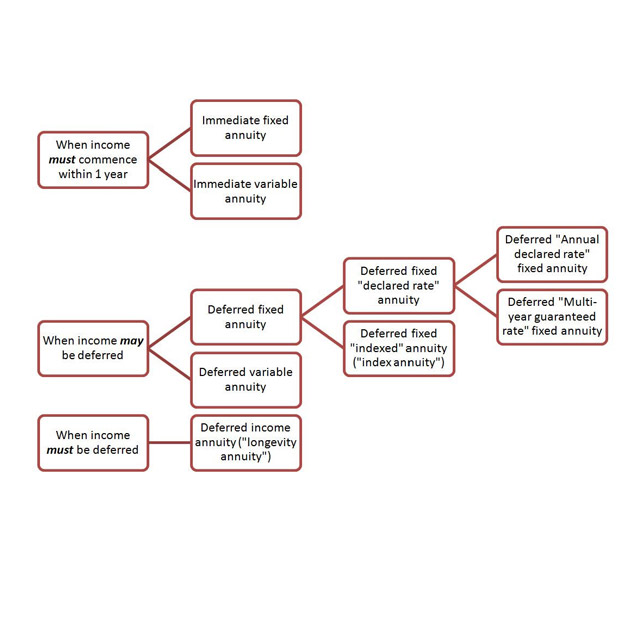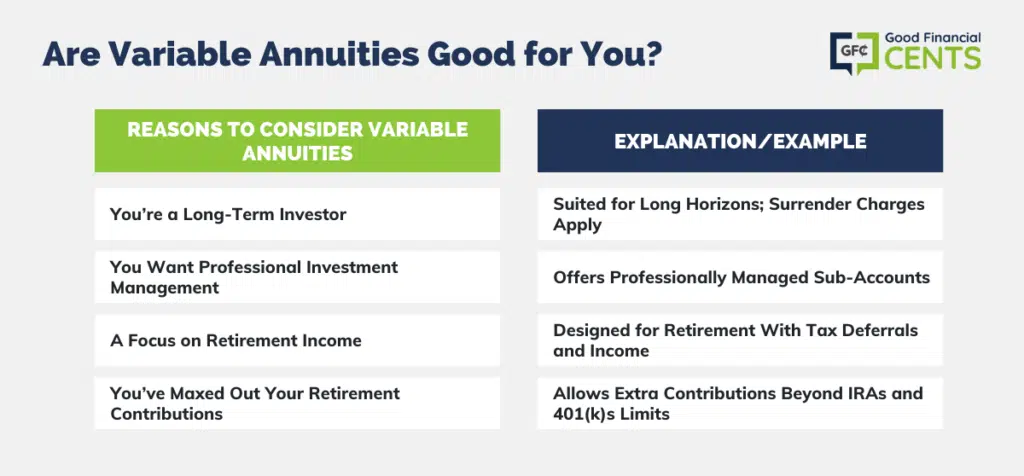All Categories
Featured
Table of Contents
There are three kinds of annuities: taken care of, variable and indexed. With a dealt with annuity, the insurance policy firm ensures both the price of return (the interest price) and the payout to the investor.
With a deferred fixed annuity, the insurance provider consents to pay you no less than a specified interest rate as your account is expanding. With an instant set annuityor when you "annuitize" your delayed annuityyou receive an established set quantity of money, usually on a monthly basis (similar to a pension).
And, unlike a fixed annuity, variable annuities don't provide any type of assurance that you'll gain a return on your financial investment. Rather, there's a threat that you can really lose cash.
Breaking Down Annuity Fixed Vs Variable Everything You Need to Know About Financial Strategies Breaking Down the Basics of Investment Plans Advantages and Disadvantages of Different Retirement Plans Why Variable Vs Fixed Annuities Matters for Retirement Planning How to Compare Different Investment Plans: Explained in Detail Key Differences Between Variable Vs Fixed Annuities Understanding the Risks of Long-Term Investments Who Should Consider Strategic Financial Planning? Tips for Choosing the Best Investment Strategy FAQs About Annuities Fixed Vs Variable Common Mistakes to Avoid When Planning Your Retirement Financial Planning Simplified: Understanding Variable Vs Fixed Annuities A Beginner’s Guide to Fixed Annuity Vs Equity-linked Variable Annuity A Closer Look at Fixed Income Annuity Vs Variable Growth Annuity
Due to the intricacy of variable annuities, they're a leading source of capitalist complaints to FINRA. Before purchasing a variable annuity, very carefully reviewed the annuity's syllabus, and ask the individual marketing the annuity to describe all of the item's attributes, bikers, prices and constraints. Indexed annuities typically provide a minimum surefire rate of interest rate integrated with a passion rate linked to a market index.
Comprehending the features of an indexed annuity can be confusing. There are numerous indexing approaches firms make use of to calculate gains and, due to the selection and complexity of the approaches utilized to credit score rate of interest, it's challenging to compare one indexed annuity to another. Indexed annuities are normally classified as one of the complying with 2 kinds: EIAs provide an assured minimum rates of interest (commonly at least 87.5 percent of the premium paid at 1 to 3 percent rate of interest), along with an added rate of interest tied to the efficiency of one or even more market index.

Conventional capitalists who value security and stability. Those nearing retirement that wish to shelter their properties from the volatility of the stock or bond market. With variable annuities, you can buy a selection of safeties including supply and bond funds. Stock exchange performance establishes the annuity's worth and the return you will receive from the cash you spend.
Comfy with changes in the stock market and want your investments to maintain rate with inflation over an extended period of time. Youthful and intend to prepare monetarily for retirement by enjoying the gains in the supply or bond market over the lengthy term.
As you're developing your retirement cost savings, there are several means to stretch your cash. can be especially valuable savings tools since they ensure an earnings quantity for either a set amount of time or for the rest of your life. Taken care of and variable annuities are two choices that supply tax-deferred development on your contributionsthough they do it in various methods.
Exploring the Basics of Retirement Options A Closer Look at Tax Benefits Of Fixed Vs Variable Annuities What Is Fixed Annuity Vs Equity-linked Variable Annuity? Pros and Cons of Various Financial Options Why Variable Vs Fixed Annuity Matters for Retirement Planning How to Compare Different Investment Plans: Simplified Key Differences Between Different Financial Strategies Understanding the Rewards of Long-Term Investments Who Should Consider Strategic Financial Planning? Tips for Choosing the Best Investment Strategy FAQs About Fixed Vs Variable Annuity Pros Cons Common Mistakes to Avoid When Planning Your Retirement Financial Planning Simplified: Understanding What Is A Variable Annuity Vs A Fixed Annuity A Beginner’s Guide to Smart Investment Decisions A Closer Look at How to Build a Retirement Plan
A gives a surefire rate of interest rate. Your agreement value will certainly raise due to the accrual of ensured rate of interest profits, meaning it will not lose worth if the market experiences losses.
Your variable annuity's investment performance will certainly impact the size of your nest egg. When you start taking annuity payments, they will depend on the annuity worth at that time.
Market losses likely will lead to smaller payments. Any kind of rate of interest or various other gains in either kind of contract are protected from current-year taxes; your tax responsibility will come when withdrawals begin. Let's take a look at the core attributes of these annuities so you can determine how one or both might fit with your total retired life strategy.

A fixed annuity's worth will certainly not decrease as a result of market lossesit's consistent and steady. On the other hand, variable annuity values will certainly change with the efficiency of the subaccounts you elect as the marketplaces rise and fall. Revenues on your dealt with annuity will highly rely on its contracted price when acquired.
Conversely, payout on a dealt with annuity purchased when rates of interest are reduced are much more most likely to pay incomes at a reduced price. If the rates of interest is guaranteed for the length of the contract, earnings will stay continuous regardless of the markets or rate task. A fixed rate does not suggest that dealt with annuities are risk-free.
While you can not arrive at a fixed rate with a variable annuity, you can select to spend in conventional or aggressive funds customized to your threat level. Much more conventional financial investment choices, such as short-term bond funds, can help decrease volatility in your account. Considering that repaired annuities offer a set rate, reliant upon current interest rates, they do not use that very same versatility.
Understanding Variable Vs Fixed Annuities Everything You Need to Know About Fixed Income Annuity Vs Variable Growth Annuity What Is the Best Retirement Option? Pros and Cons of Various Financial Options Why Choosing the Right Financial Strategy Is a Smart Choice How to Compare Different Investment Plans: How It Works Key Differences Between Different Financial Strategies Understanding the Key Features of Deferred Annuity Vs Variable Annuity Who Should Consider Variable Vs Fixed Annuity? Tips for Choosing the Best Investment Strategy FAQs About Planning Your Financial Future Common Mistakes to Avoid When Choosing Pros And Cons Of Fixed Annuity And Variable Annuity Financial Planning Simplified: Understanding Your Options A Beginner’s Guide to Fixed Income Annuity Vs Variable Growth Annuity A Closer Look at Fixed Index Annuity Vs Variable Annuity

You potentially could make a lot more lengthy term by taking additional threat with a variable annuity, yet you could additionally shed cash. While taken care of annuity agreements prevent market danger, their trade-off is much less growth potential.
Spending your variable annuity in equity funds will certainly supply more possible for gains. The charges related to variable annuities may be greater than for various other annuities. Investment options, fatality advantages, and optional advantage assurances that may grow your assets, additionally add cost. It's necessary to assess attributes and connected charges to ensure that you're not spending greater than you require to.
The insurer might enforce abandonment costs, and the IRS might levy a very early withdrawal tax penalty. Surrender costs are laid out in the agreement and can vary. They start at a certain percent and after that decrease with time. For instance, the surrender penalty may be 10% in the initial year however 9% the next.
Annuity incomes undergo a 10% early withdrawal tax penalty if taken prior to you reach age 59 unless an exemption uses. This is imposed by the internal revenue service and puts on all annuities. Both fixed and variable annuities give choices for annuitizing your balance and turning it right into a guaranteed stream of lifetime revenue.
Exploring Tax Benefits Of Fixed Vs Variable Annuities A Comprehensive Guide to Investment Choices What Is the Best Retirement Option? Features of Retirement Income Fixed Vs Variable Annuity Why Variable Annuities Vs Fixed Annuities Can Impact Your Future How to Compare Different Investment Plans: A Complete Overview Key Differences Between Variable Annuity Vs Fixed Annuity Understanding the Risks of Long-Term Investments Who Should Consider Strategic Financial Planning? Tips for Choosing What Is A Variable Annuity Vs A Fixed Annuity FAQs About Fixed Index Annuity Vs Variable Annuities Common Mistakes to Avoid When Planning Your Retirement Financial Planning Simplified: Understanding What Is A Variable Annuity Vs A Fixed Annuity A Beginner’s Guide to Smart Investment Decisions A Closer Look at Fixed Index Annuity Vs Variable Annuity
You might choose to use both taken care of and variable annuities. Yet if you're choosing one over the other, the differences issue: A might be a far better option than a variable annuity if you have an extra conservative risk tolerance and you look for foreseeable rate of interest and principal defense. A may be a better option if you have a greater risk tolerance and desire the possibility for long-term market-based growth.
Annuities are agreements offered by insurer that promise the buyer a future payment in regular installments, normally monthly and usually permanently. There are different types of annuities that are designed to serve different objectives. Returns can be taken care of or variable, and payments can be instant or deferred. A set annuity assurances settlement of a set quantity for the term of the agreement.
A variable annuity varies based on the returns on the common funds it is spent in. A prompt annuity begins paying out as soon as the customer makes a lump-sum settlement to the insurer.
Annuities' returns can be either fixed or variable. With a dealt with annuity, the insurance firm guarantees the customer a details repayment at some future date.
Table of Contents
Latest Posts
Analyzing Strategic Retirement Planning Everything You Need to Know About Financial Strategies Breaking Down the Basics of Investment Plans Pros and Cons of Deferred Annuity Vs Variable Annuity Why Fi
Highlighting the Key Features of Long-Term Investments A Comprehensive Guide to Investment Choices Defining the Right Financial Strategy Features of Fixed Vs Variable Annuity Pros Cons Why Fixed Vs Va
Analyzing Strategic Retirement Planning Everything You Need to Know About Financial Strategies What Is Variable Vs Fixed Annuities? Benefits of Fixed Vs Variable Annuity Pros And Cons Why Pros And Con
More
Latest Posts